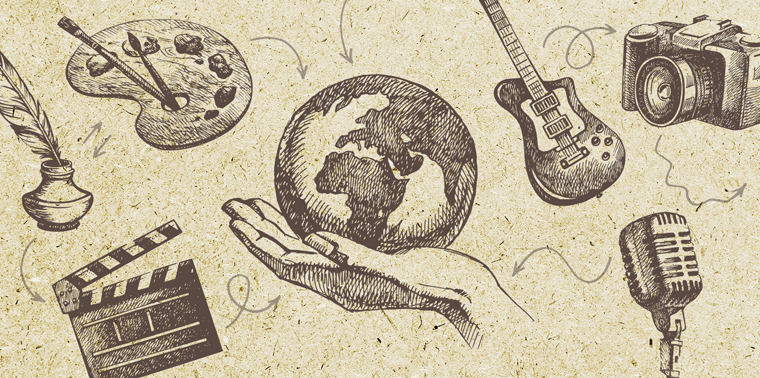February 1, 2018 — What role might the arts play in response to climate change and related economic and ecological crises?
In the 1997 film “Titanic,” Wallace Hartley, the violinist and leader of the band on the ill-fated ship, turns to his band mates as the water rises around him and says: “Gentlemen, it has been a privilege playing with you tonight.” Is the only contribution musicians and other artists can make at this moment in history to bravely go down with the ship, lifting the spirits of fellow passengers? On its own terms that’s an honorable contribution, but surely we can do more.
It’s often said that a novel, a painting, a song or a motion picture changed the world. What that really means is, it changed how a lot of people thought or felt about the world.
Anthropologists and historians rightly argue that society’s major transformations have emerged not from the arts, but from our relationship to our environment — for example, our shift from hunting and gathering to agriculture, or from using firewood as our main energy source to using fossil fuels.
Artists’ efforts help shape the terms by which society adapts to such transformations and their consequences.Nevertheless, artists’ efforts help shape the terms by which society adapts to such transformations and their consequences. And this can be a big deal. Think of how Beethoven marked the beginnings of modern democracy, the Romantic Movement in poetry and philosophy, and the nascent Industrial Revolution with music that shattered the aristocratic formalism of previous generations. Or how Hollywood writers and directors galvanized massive support for the U.S. war effort during the early 1940s.
Now think ahead.
We have embarked on a century in which the societal systems built since the start of the Industrial Revolution — our food system, our transport systems, our energy system, our built environment, our financial system, and possibly our political and governance systems as well — will prove unsustainable. All were designed during an era in which fossil fuels met the great bulk of our fast-growing energy demand. Cheap, abundant, and easy to store and transport, these fuels facilitated long-distance transportation, and hence centralized, globalized systems of production and distribution. Economic growth would probably never have become the organizing principle of politics and society if we had never started burning coal, oil and natural gas.
But fossil fuels are exhaustible resources, and their depletion will drive evermore desperate methods of extraction, create evermore environmental risk and require evermore capital — even as alternative energy sources also demand far more investment. The economic and political implications are barely fathomable.
Everything will be up for negotiation, redesign and change.Further, burning fossil fuels changes our planet’s climate. So, at the same time our economy will need to be redesigned to run on entirely different energy sources, the natural world will be shifting around us in unprecedented ways, with more frequent catastrophic storms, floods and droughts. Sea level will rise. Cities will be forced to move to higher ground. Whole populations will migrate toward the poles and inland.
Everything will be up for negotiation, redesign and change.
And artists will have the opportunity and duty to translate the resulting tumultuous human experience into words, images, and music that help people not just to understand these events mentally, but also to come to grips with them viscerally.
The economic and environmental shifts described above are currently being detailed in ever-greater specificity in hundreds of reports released yearly by climate and energy experts — though in terms the average person struggles with. What’s missing in their carefully worded journal articles are the human dimensions of imagination, joy or sorrow, inspiration, and passion. No wonder so many of us simply deny their message or tune it out.
Art can help us cope with the implications of our collective challenges. Art can help us cope with the implications of our collective challenges. It can help prepare society for a possibly traumatic future. It can give voice to suffering and loss, helping people deal with life’s inevitable stress. And it can also offer beauty, which can be especially important in hard times.
Of course, to be good, art has to succeed in terms of structure, skill, insight and originality. Bad art with a valid social message is still bad art, and it will take far more than just an increase in the number of climate change-themed TV series, movies, operas, dystopian novels, county-western songs, art installations, hip-hop verses, and performance pieces to show us the way. Artists will need to dig deeper, observe more closely and help their audiences connect abstract explanations and forecasts with concrete experiences.
As we move closer to what surely will be unprecedented ecological, economic and social disruption, meaningful art can and must express the turmoil we encounter and help us process it intellectually and emotionally.
In this sense, our need for truly great artists has never been keener. ![]()
Editor’s note: The views expressed here are those of the author and not necessarily of Ensia. We present them to further discussion around important topics. We encourage you to respond with a comment below, following our commenting guidelines, which can be found on this page. In addition, you might consider submitting a Voices piece of your own. See Ensia’s Contact page for submission guidelines.
Ensia shares solutions-focused stories free of charge through our online magazine and partner media. That means audiences around the world have ready access to stories that can — and do — help them shape a better future. If you value our work, please show your support today.
Yes, I'll support Ensia!
